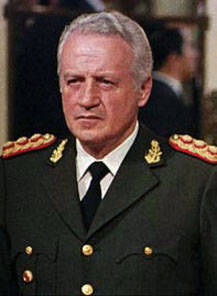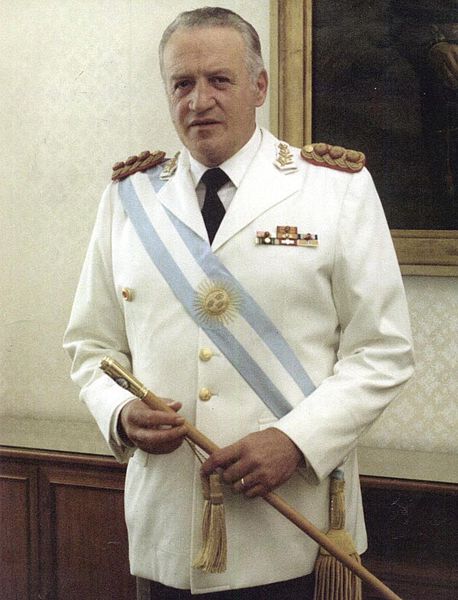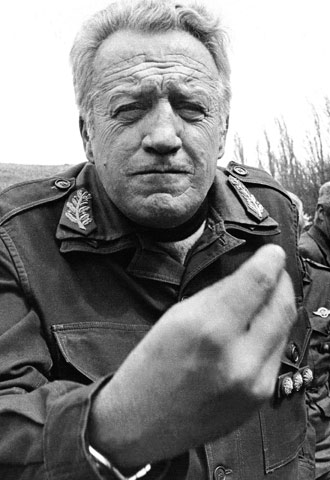<Back to Index>
- Philosopher Jacques Derrida, 1930
- Writer Kunikida Doppo, 1871
- Dictator of Argentina Leopoldo Fortunato Galtieri Castelli, 1926
PAGE SPONSOR



Leopoldo Fortunato Galtieri Castelli (July 15, 1926 – January 12, 2003) was an Argentine general and President of Argentina from December 22, 1981 to June 18, 1982, during the last military dictatorship (known officially as the National Reorganization Process). The death squad Intelligence Battalion 601 directly reported to him. He was removed from power soon after the British retook the Falklands Islands, whose invasion he had ordered.
Galtieri was the child of working class parents who were poor Italian immigrants. At 17 he enrolled at the National Military Academy to study civil engineering, and his early military career was as an officer in the engineering branch.
In 1975, after more than 25 years as a combat engineer, he became commander of the Argentine engineering corps. He was an enthusiastic supporter of the military coup that started the self - styled National Reorganisation Process in 1976 and rose further, becoming a major general in 1977, and commander - in - chief in 1980 with the rank of lieutenant general.
During the junta's rule, Congress was suspended, unions, political parties and provincial governments were banned, and in what became known as the "Dirty War" between 9,000 and 30,000 people deemed left wing "subversives" disappeared from society. Torture and mass executions were both commonplace. The economy, which had been in dire condition prior to the coup, recovered for a short time, then deteriorated further.
In March 1981, Galtieri visited the United States and was warmly received, as the Reagan administration viewed the regime as a bulwark against communism. National Security Advisor Richard V. Allen described him as a "majestic general." An adherent to the Argentine military's Cold War era doctrine of "ideological frontiers," Galtieri secured his country's support for the Contras in August, sending advisers to help organize the Nicaraguan Democratic Force (FDN, for a time the principal Contra group), as well as training FDN leaders in Argentine bases. His support for this initiative, in turn, allowed Galtieri to remove a number of rival generals and, in December 1981, he rose to the Presidency of Argentina by means of a coup that ousted General Roberto Viola. Argentine support became the principal source of funds and training for the Contras during Galtieri's tenure.
Galtieri retained direct control of the army and did not appoint a new commander - in - chief. He appointed conservative economist and publisher Roberto Alemann as Economy Minister. Alemann inherited an economy in deep recession in the aftermath of José Alfredo Martínez de Hoz's deregulatory and free trade policies of the late 1970s. Alemann slashed spending, began selling off government owned industries (with only minor success), enacted a tight monetary policy, and ordered salaries frozen (amid 130% inflation). The Central Bank Circular 1050, which tied mortgage rates to the value of the US dollar locally, was maintained, however, leading to further deepening of the crisis; GDP fell by 5%, and business investment by 20% over the weakened levels of 1981.
One of his closest allies, the head of the First Army Corps, General Guillermo Suárez Mason, was named Chairman of YPF, at the time the state petroleum concern, and the largest company of any type in Argentina. Suárez Mason's turn at YPF would help result in a US$ 6 billion loss for the company – the largest recorded corporate loss in the world, up to that point.
Galtieri
instituted limited political reforms which allowed the expression of
dissent, and anti - junta demonstrations soon became common, as did
agitation for a return to democracy. After Galtieri had been in office for four months and with his popularity low, Argentine forces invaded the lightly defended British Falkland Islands in April 1982. The United Kingdom, United Nations, and many other countries around the world condemned the annexation (the
US eventually joined the chorus after initially equivocating), yet in
Argentina the invasion was wildly popular. The anti - junta
demonstrations were replaced by patriotic demonstrations in support of
Galtieri. On the morning of April 2, 1982, the first day of the
invasion, a small group of people gathered in the historic Plaza de
Mayo, across from the Casa Rosada,
the government site. After a while Galtieri showed up on one of the
balconies (not the same used by Perón but one to the left of it)
and raised his hands to cheer the small group of supporters. A few
minutes later a siren was heard and many bystanders started to flee in
panic, reminiscent of the tough repression that happened just a few
days before in the same place, on March 30. Galtieri (as most of his government) thought that the United Kingdom would never respond militarily and in the worst case scenario the United States would not interfere after the support given by the junta to the Central Intelligence Agency in its fight against the Sandinistas in Nicaragua and the warm welcome given to Galtieri after a recent visit to Washington DC. However, after diplomatic pressure and negotiations led nowhere, the UK government, led by the Prime Minister, Margaret Thatcher,
decided to re-take the islands, and deployed naval task forces to do
so. Despite the numerical and geographic advantages held by Argentina,
the superior training and technology of the British armed forces
ensured British victory in the Falklands War within two months. Falklands capital Stanley was
retaken by the British forces in June 1982, and within days General
Galtieri was removed from power. He spent the next 18 months at a
well protected country retreat while democracy was restored to
Argentina. Along with other members of the former junta, he was
arrested in late 1983 and charged in a military court with human rights
violations during the Dirty War, and with mismanagement of the Falklands War. The Argentine Army's internal investigation, known as the Rattenbach report after the General who led it, recommended Galtieri be stripped off all rank, dismissed and face a firing squad, but in 1986 he was sentenced to 12 years prison. He
was cleared of the civil rights charges in December 1985 but (together
with the Air Force and Navy commanders - in - chief) found guilty of
mishandling the war in May 1986 and sentenced to prison. All three
appealed (this time in a civil court) while the prosecution appealed
for heavier sentences. In November 1988 the original sentences were
confirmed and all three commanders were stripped of their rank. In
1989, Galtieri and 39 other officers of the dictatorship received
President Carlos Menem's pardon.
In
July 2002 new civil charges were brought concerning the kidnapping of
children and disappearance of 18 leftist sympathizers in the late 1970s
(while Galtieri was commander of the Second Army Corps), and the
disappearance or death of three Spanish citizens at about the same
time. Galtieri was placed under house arrest. With his health
declining, he was admitted to a hospital in Buenos Aires to be treated
for
cancer of the pancreas. He died there of a heart attack at the age of 76.